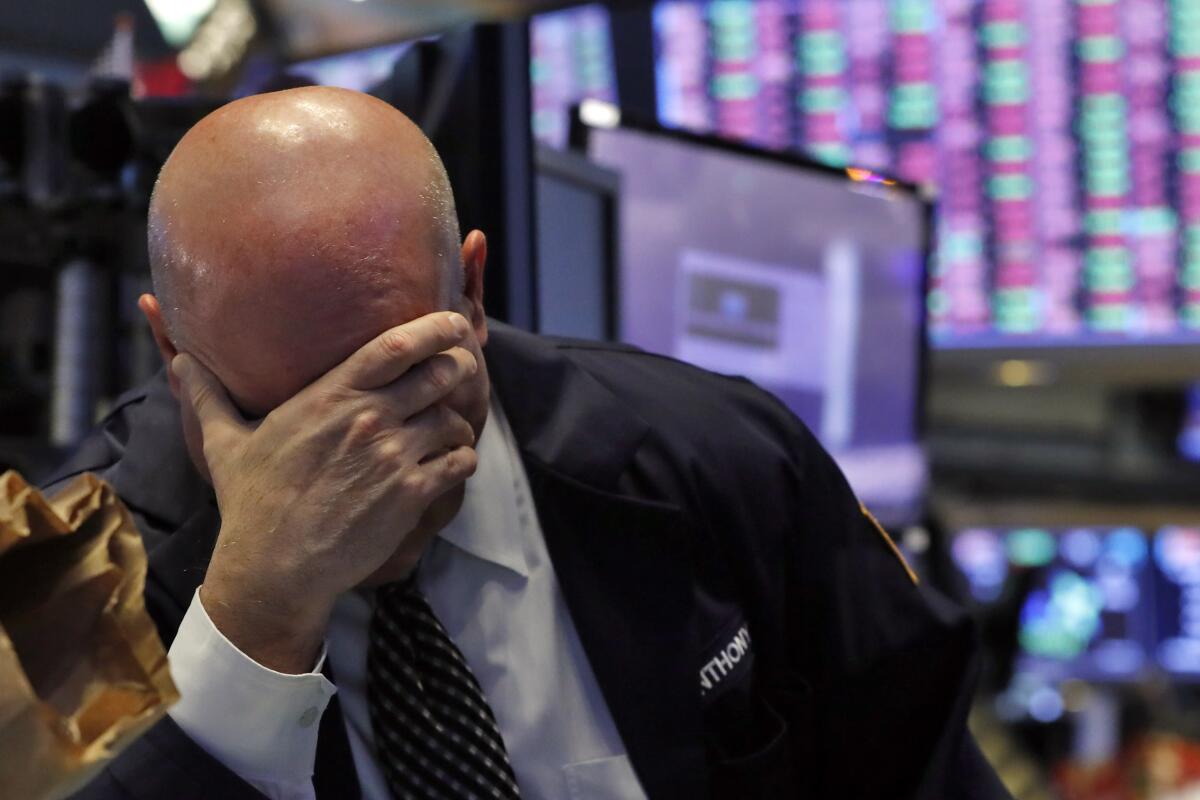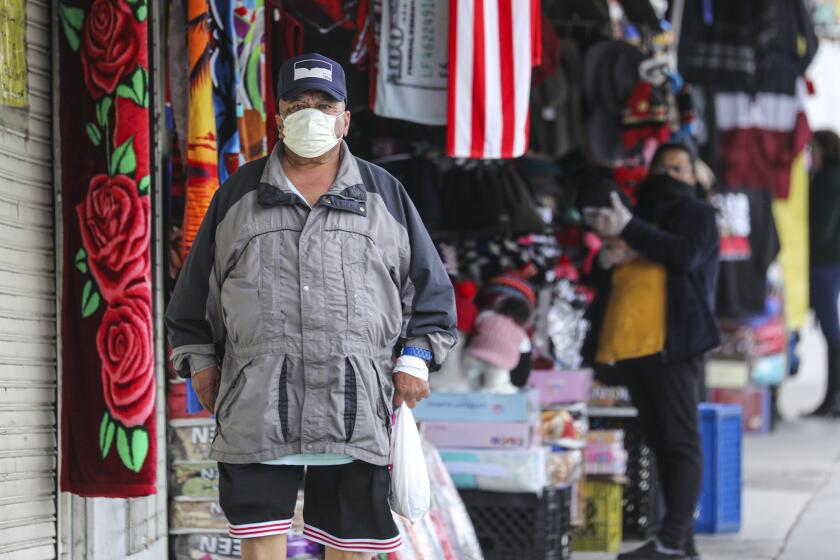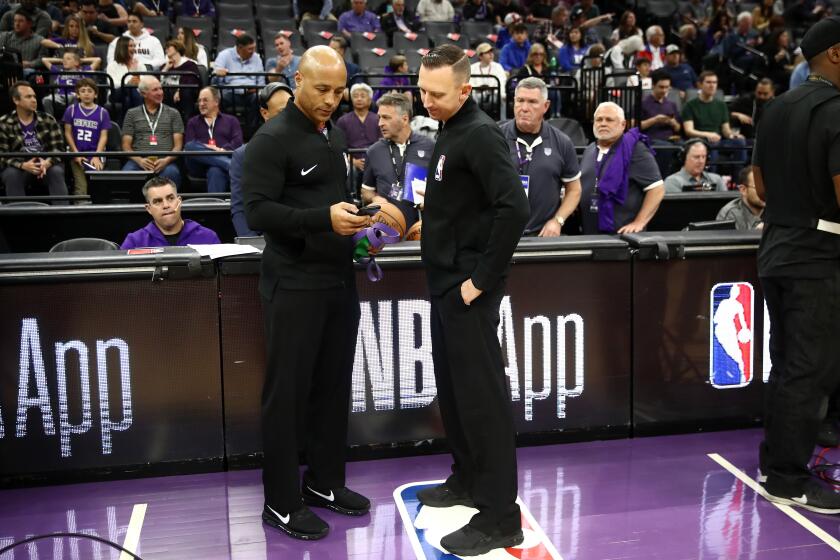Coronavirus brings stock market its worst day since 1987

Financial markets exercised their own form of social distancing Thursday as they ignored friendly intervention and plunged deeply into bear territory amid coronavirus fears, notching their worst day of trading since the 1987 crash.
Neither an automatic timeout in trading, nor a $1.5-trillion Federal Reserve pledge to sop up the bond market, nor a series of clarifications and reassurances from the Trump administration could stem a selling contagion. The market listened, then spun on its heels and sold. The Dow Jones industrial average fell 2,352 points, down about 10%, with the S&P 500 and Nasdaq trimming 9.5% and 9.4%, respectively.
The pain was widespread. Travel plummeted over government restrictions and concerns about containment of the virus. Energy was particularly hard hit as an oil price war coupled with an anticipated fall in demand weighed on investors. Technology firms faltered, with Amazon dropping nearly 8% and Apple falling 9.9% over questions about its supply chain and sales in China. The consumer durables sector notched one of the market’s few gains, up more than 6%, as buyers hoard supplies.
Investors were not convinced by President Trump’s Wednesday-night speech, nor his Thursday reassurance that the markets would bounce back “very big at the right time.” Within hours, they sent a message back that Thursday was not that time.
Some took the coronavirus panic as validation of an ongoing hunch that the market was overvalued, said René Nourse, a CNBC commentator and founder of Urban Wealth Management, an El Segundo financial advisory firm. “When the coronavirus happened it kicked the door down.”
Get the latest coronavirus updates from our staff in California and around the world.
With the market in chaos, talk in Washington turned to remedies. Few of them promise help in the short term.
Trump reiterated his proposal to suspend the payroll (Social Security) tax even as key members of Congress remained skeptical about its multi-billion-dollar cost and scant prospects of turning things around quickly.
For an employee making $25,000 a year, the deduction hiatus would leave an extra $60 in take-home pay every two weeks.
That is no solace to those in the gig economy who are not covered by the payroll tax or those outside the labor force, including the elderly. Any temporary tax savings is easily erased by furloughs and cuts in hours tied to economic disruptions, which now include a drop in demand for goods and services atop the early disruptions in supply from countries such as China.
New victims include the ushers, ticket takers, janitors and food service workers in Southern California sports venues, including Dodger Stadium, Angel Stadium, Staples Center, Banc of California Stadium, Dignity Health Sports Park and Honda Center. Major League Baseball pushed back the season opener by at least two weeks, while the National Basketball Assn., the National Hockey League and Major League Soccer suspended their games indefinitely.
Disneyland Park and Disney California Adventure likewise will close until the end of the month, though Disney Co. said it would continue to pay its 30,000 workers at the Anaheim resort.
Talks of workforce reductions, including buyouts, already are underway for transportation companies affected by Trump’s Wednesday night announcement that he would suspend travel from 26 European countries. At least one foreign carrier has announced plans to lay off workers.
“I am concerned that this is more far-reaching than 9/11,” said Lori Bassani, president of the union that represents American Airlines flight attendants. After those attacks two decades ago, flights were halted nationwide for three days. Americans’ reluctance to fly lasted months. The drop in demand resulted in heavy losses to airlines.
Airline stocks were hit hard Thursday — Spirit Airlines suffered a nearly 33% drop while the parent company of United Airlines shed 25%.
Princess Cruises, a subsidiary of Carnival Corp., announced Thursday morning that it was suspending operations for 60 days. The move came after 21 people on its Grand Princess ship tested positive for the virus, triggering delays and quarantines for thousands. Viking Cruises likewise said it was suspending operations until May 1.
Princess did not say whether it would continue to pay salaries to the 35,000 employees of its 18 cruise ships during the 60-day stoppage. Viking also did not reveal salary plans for its 10,000 employees tending its 70 vessels.
The announcements drove cruise company stocks down sharply — Norwegian, Royal Caribbean and Carnival stocks each shed more than 30%.
As California called for a ban on gatherings of 250 or more people, Disneyland took the unprecedented action of announcing it will close the park through the end of the month.
A proposed extension of the April 15 deadline for tax returns, floated by Treasury Secretary Steven T. Mnuchin, would at best postpone the pain for workers and companies owing the federal government. With 80% of those owing income tax making more than $100,000 a year, according to Oxford Economics, it’s hardly those earning ticket-taker’s pay who might benefit.
Democrats led by House Speaker Nancy Pelosi have proposed paid sick leave to cover a 14-day quarantine as well as increased food aid, more unemployment insurance and free medical testing. Those ideas face push-back from Republicans, raising the possibility that Congress will recess before passing a relief bill.
Late Thursday, Pelosi vowed to bring a bill to the floor despite criticism from House Minority Leader Kevin McCarthy (R-Bakersfield) that the measure “comes up short.” He added that Congress may postpone a recess by 24 to 48 hours.
The Democrats’ plan would cover two-thirds of salary for workers at companies that don’t provide the benefit. Businesses that would have to foot the bill for paid leave could be compensated with tax credits, a move welcomed by Holly Wade, director of research and policy analysis at the National Federation of Independent Business, the leading small-business lobby.
The Trump administration appears more focused on the stock market numbers and on businesses most affected by the economic slow-down, such as transportation services, which will suffer from Trump’s newly announced travel ban, set to go into effect Saturday morning. U.S. energy firms appear to be candidates as well, amid an ongoing oil price war between Saudi Arabia and Russia.
Trump was quick to bail out agriculture during the trade war with China but has vacillated on what he would have done during the Great Recession when the auto industry was bailed out by the federal government.
“Bailing out specific companies should only happen if failure of those companies can’t be handled using the bankruptcy system and their failure would do serious damage to the broader economy,” said Mark Zandi, chief economist at Moody’s Analytics. “Providing financial support to specific industries and companies should be the last thing on the list of fiscal stimulus measures.”
Trump said he planned to ask Congress for $50 billion more for the Small Business Administration so it could offer low-interest loans to smaller firms.
But surveys of small businesses show access to credit isn’t a problem for most of them right now, so it’s unclear how much help such a measure could bring.
Times staff writers Laurence Darmiento, Hugo Martín and James F. Peltz contributed to this report, as well as Times wire services.
More to Read
Inside the business of entertainment
The Wide Shot brings you news, analysis and insights on everything from streaming wars to production — and what it all means for the future.
You may occasionally receive promotional content from the Los Angeles Times.














